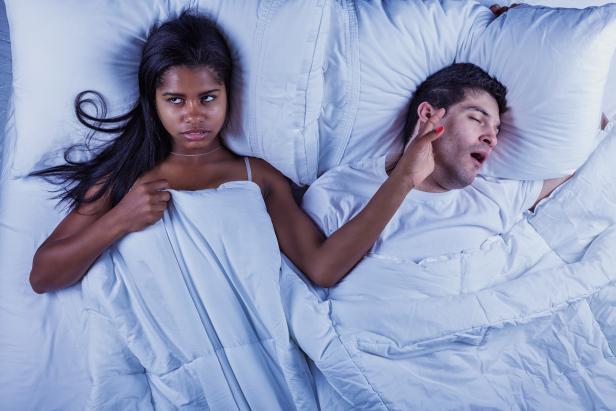Here's Why More Women Struggle with Insomnia Than Men
Here’s why he’s snoozing away while you’re wide awake


Justin Horrocks
If you’re a woman who is tossing and turning at night and then yawning all day, you aren’t alone. The reason you aren’t getting a full night’s sleep may have more to do with your gender than your bedtime.
According to a survey by the National Sleep Foundation, insomnia is considerably more common in women than men. In fact, studies found that insomnia is reportedly 40% higher in women. Researchers say there isn’t one single factor that’s keeping women up at night, it’s actually a combination of factors that ruin our sleep.
Here’s five of the top reasons women aren’t sleeping but men are getting their zzzs.
- One reason women aren’t getting as much sleep as men could be how they process their mental health. According to the Sleep Foundation, "Sleep is often tied to mental health, and women are more likely than men to suffer from sleeping problems associated with conditions like depression, anxiety, and stress."
- Researchers also noted that women are less likely to be diagnosed with sleep apnea. Men are more commonly referred to sleep clinics to deal with snoring or blocked airways while they sleep and find different interventions to help them get to sleep. Since women aren’t being seen for these issues, they aren’t being diagnosed or receiving the same interventions as men.
- Frequent bathroom breaks could be interrupting women’s sleep too. "Bladder problems can contribute to frequent urination at night, also known as nocturia, that can be a barrier to uninterrupted sleep," writes the Sleep Foundation. "Women are twice as likely as men to suffer from urinary incontinence and other symptoms of an overactive bladder. Studies estimate that 76% of women over 40 experience frequent urination at night."
- Hormones from pregnancy, menstruation, and menopause can interrupt women’s sleep at different times in their lives. Shifting hormones during a woman’s life can cause fluctuations of estrogen and progesterone, which has been shown to interrupt a woman’s sleep.
- Not only are women feeling restless but they are also dealing with Restless Leg Syndrome more than men. "Restless leg syndrome (RLS) is a condition in which a person has a strong urge to move their limbs, especially their legs, when lying down and is commonly associated with sleep difficulties. Though the exact cause is unknown, RLS is more common in women than men."
So how can women get a better night’s sleep? Here’s what the experts say:
- Talk to your doctor if you are struggling with sleepless nights, falling asleep, or staying asleep.
- Set a sleep schedule– when to go to bed and when to wake up– and stick to it. Even on the weekends.
- Avoid all screens for at least an hour before bed. This means your phone, tablet, TV, and computer.
- Limit caffeine and alcohol during the day.
- Create a comfortable bedroom. Keep it dark and cool, upgrade your mattress, pillows, and bedding, and limit lights and noise.
YOU MIGHT ALSO LIKE:












.jpg.rend.hgtvcom.231.174.suffix/1725650866453.jpeg)


